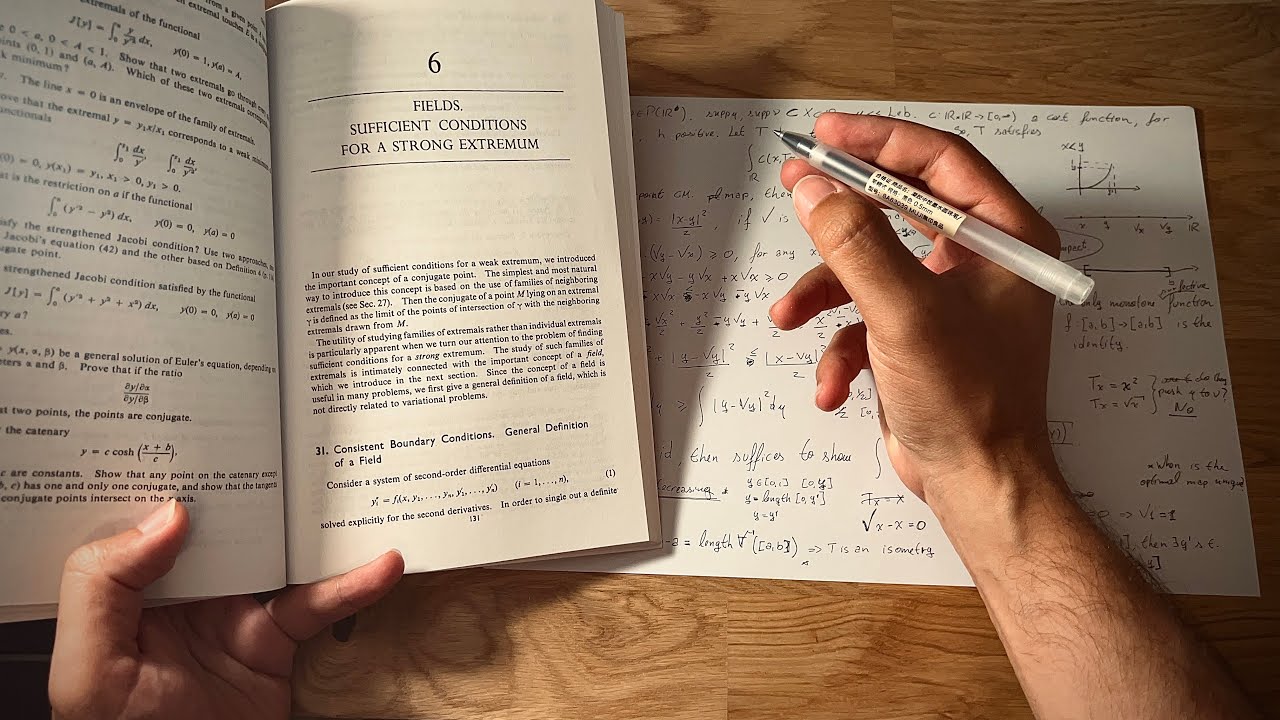What is the proper way to study Mathematics? | IIT prof's tips
Summary
TLDRThe video script emphasizes the importance of self-study in mastering mathematics, as opposed to an over-reliance on teachers for theoretical knowledge and examples. The speaker suggests that students should select a comprehensive textbook and engage deeply with the material, including understanding theorems, reproducing them independently, and contemplating their implications. Solved examples should be used to apply this knowledge, and students are encouraged to attempt problems independently before consulting solutions. The process involves a postmortem analysis of both successful and unsuccessful problem-solving attempts to identify shortcomings and reinforce learning. The speaker also highlights the significance of starting with basic problems to build a strong foundation before tackling more complex ones. The summary concludes with a congratulatory note to students who successfully solved a posted problem, underscoring the value of a methodical and comprehensive approach to mathematical study.
Takeaways
- 📚 Mathematics requires self-study for true understanding beyond classroom learning.
- 📊 A significant number of students overly rely on teachers for theory and examples.
- 📝 Achieving mathematical maturity is essential for mastering mathematics.
- 🔍 Effective self-study involves understanding theorems deeply and reproducing them from memory.
- 📖 Select a comprehensive textbook for self-study rather than relying on books filled with solved problems.
- 🔄 Treat solved examples as opportunities to apply knowledge, not just pattern matching exercises.
- 💡 Approach problems independently before looking at solutions to reinforce learning.
- 🧩 Solving easy problems is crucial for building a foundation before tackling more complex ones.
- 🧠 Postmortem analysis of why a problem was solved or not is essential for improvement.
- 🎉 Celebrating successful problem-solving builds confidence and reinforces correct approaches.
Q & A
What is the main issue the speaker identifies with students' approach to studying mathematics?
-The speaker identifies an over-reliance on teachers for theory and examples as the main issue, which hinders students from achieving mathematical maturity and truly understanding the subject.
What does the speaker suggest as an alternative to relying solely on teachers?
-The speaker suggests self-study as an alternative, emphasizing the importance of deep self-study in addition to practice for a proper grasp of mathematics.
What is the speaker's recommendation for selecting a textbook for self-study?
-The speaker recommends picking up a very good textbook that presents the theory comprehensively, written by a proper expert in the subject, rather than commercial books that focus on solved problems.
How does the speaker propose students approach the process of self-study?
-The speaker proposes that students should study theorems on their own, reproduce them without looking, think about the implications, and then apply this knowledge to solved examples and problems, ensuring they understand the core concepts.
What is the significance of reproducing a theorem on a piece of paper after studying it?
-Reproducing a theorem helps to create connections in the brain with the studied material, reinforcing the learning process and aiding in understanding the core concepts more deeply.
How should students approach solved examples during self-study?
-Students should not immediately look at the solution but first try to apply the theorems they've learned to the example, think about possible approaches, and only then consult the solution to reinforce their learning.
Why is it important for students to attempt easy problems as well?
-Easy problems are crucial for building a strong foundation in mathematics. They help students become proficient with basic concepts and theorems before moving on to more complex problems.
What is the speaker's advice regarding the use of solutions and resources when solving problems?
-The speaker advises students to first try problems on their own, exhaust all possibilities, and only then consult solutions. They should also perform a postmortem analysis to understand why they couldn't solve the problem and learn from it.
What is the role of a teacher in the learning process according to the speaker?
-According to the speaker, a teacher should serve as a guide, providing introductions to subjects and pointing students in the right directions. However, it is up to the student to follow these directions and discover the subject matter independently.
What is the significance of mathematical maturity in learning mathematics?
-Mathematical maturity is essential for truly grasping mathematics at its core. It involves the ability to think independently, make connections across different theorems, and understand the implications of mathematical concepts.
How does the speaker evaluate the performance of students who attempted the problem posted in the community?
-The speaker evaluates the students' performance based on the correctness and completeness of their solutions. They congratulate the students who successfully solved the problem and appreciate those who thought in the proper direction, even if they missed some parts of the argument.
Outlines

このセクションは有料ユーザー限定です。 アクセスするには、アップグレードをお願いします。
今すぐアップグレードMindmap

このセクションは有料ユーザー限定です。 アクセスするには、アップグレードをお願いします。
今すぐアップグレードKeywords

このセクションは有料ユーザー限定です。 アクセスするには、アップグレードをお願いします。
今すぐアップグレードHighlights

このセクションは有料ユーザー限定です。 アクセスするには、アップグレードをお願いします。
今すぐアップグレードTranscripts

このセクションは有料ユーザー限定です。 アクセスするには、アップグレードをお願いします。
今すぐアップグレード関連動画をさらに表示
5.0 / 5 (0 votes)






